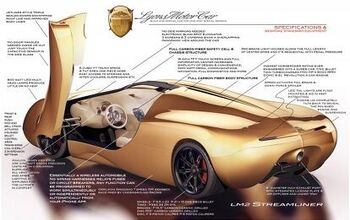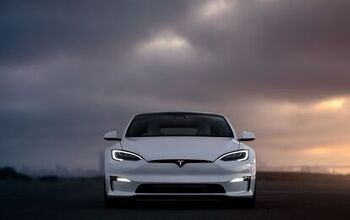Automotive Politics: A Tale of Two Industries?

Politics have corrupted just about everything under the sun over the last few years. Practically everything is political in 2020 and if you have an opinion about that, it had better be the correct one and sanctioned by your preferred party. After all, having an approved take is far more important that an accurate one. But what of the automotive industry? Where do the carmakers fall on the supposedly important spectrum?
Well, we know that the UAW predictably endorsed Joe Biden for president way back in spring. But those heading the companies distributing union members’ paychecks quite literally came to Donald Trump in 2017 to ask that he take it easy on them. Obama-era regulations had made efficiency mandates so strict, that automakers had become convinced they’d be unable to meet them in the years ahead. While Trump’s relationship with the industry often runs hot and cold, he pushed for a fueling rollback that placed federal authorities at odds with California and kicked off a regulatory conflict of epic proportions.
Assuming Biden wins the election, those stringent emissions mandates will undoubtedly come back into play — surrounded on all sides by his climate and environmental justice proposal, which makes a federal investment of $1.7 trillion over the next 10 years. While automotive exclusives are hesitant to share their regulatory fears with the general public, especially as they attempt to put on the greenest face possible for marketing purposes, there are real concerns that the U.S. could embrace policies similar to Europe. That could force a change of course for a few companies and complicate the overall trajectory for the U.S. market.
“The industry is more divided than I’ve seen it in my lifetime,” U.S. Rep. Debbie Dingell (D-MI), said in a recent interview with Bloomberg. “There’s competitive issues that drive that, but if they’re not together on those issues, they’re going to be in trouble.”
The outlet ran an assessment of what each presidential candidate winning would mean for the industry and what kind of response that might warrant this week. A Trump win wouldn’t change much. Federal regulators would still be at odds with California and the White House would be pushing for U.S. factory jobs and deregulation with “environmental justice” near the bottom of the overall list of concerns. Automakers could also pursue electrification to the heart’s content, though likely without an extension of federal EV tax credits or additional governmental support.
By contrast, Biden would likely back standards the California Air Resources Board is already pushing and continue encouraging the government to subsidize electric vehicles. While that would help create a national fueling standard without rogue states standing in the way (something automakers desperately want), his environmental plan is extremely ambitious and expensive. Biden has also entertained the idea of bringing back programs similar to 2009’s Car Allowance Rebate System (Cash for Clunkers) to encourage electric vehicle adoption. But critics have maintained that the original program was a failure that ultimately ended up creating more environmental waste, attempted to remind everyone that the Obama administration’s set emissions standards it knew were untenable, and have been suggesting the latest Democrat policies would be toxic for the long-term welfare of U.S. automotive industry.
The automotive industry would have to fundamentally change as it loses some sovereignty under a President Biden. But that’s not to suggest things would be hunky-dory under another four years of President Trump. His desire to focus on American jobs and companies has put an industry dependent upon global supply chains in a weird position eliciting an interesting response.
From Bloomberg:
Trump’s trade wars and tariff threats on imported autos and parts — which the Biden campaign has criticized — led to a lobbying shakeup for the auto industry in Washington earlier this year.
That’s when the former Alliance for Automobile Manufacturers, which represented both foreign and domestic-owned carmakers, merged with the Association of Global Automakers, which represented foreign-owned automakers. The reformed group is the Alliance for Automotive Innovation and it now focuses primarily on the push by carmakers to develop self-driving cars and steers clear of trade issues that have dominated the Trump era.
Foreign-owned carmakers which were apart of the Association of Global Automakers banded together to create a new lobbying group known as Autos Drive America. Only the American Automotive Policy Council, which lobbies for domestic carmakers, remains unchanged as Trump goes before voters for a second time.
“As always, as we go through an election period, we’ve got to sure we’re paying attention to what might change and what might stay the same and be a resource,” explained John Bozzella, CEO of the Alliance for Automotive Innovation. “Our role is to be a resource and educate and we want to be a resource to every candidate.”
Lobbying groups understand that the winds of fate are fickle and know it pays to cater to both political parties whenever possible. Most of the overt political division is happening on the corporate level with leadership trying not to make a public fuss.
General Motors, Toyota, and Fiat Chrysler Automobiles have decided to back Trump in the gas war. Automakers with a lot of facilities based in North America also benefit from the administration’s USMCA agreement. But Ford, BMW, Honda, and Volkswagen have all supported California and are presumed to be more agreeable when it comes to the prospect of a new administration adopting stricter emissions standards — likely because they have the most to gain from it.
[Image: Orhan Cam/Shutterstock]

A staunch consumer advocate tracking industry trends and regulation. Before joining TTAC, Matt spent a decade working for marketing and research firms based in NYC. Clients included several of the world’s largest automakers, global tire brands, and aftermarket part suppliers. Dissatisfied with the corporate world and resentful of having to wear suits everyday, he pivoted to writing about cars. Since then, that man has become an ardent supporter of the right-to-repair movement, been interviewed on the auto industry by national radio broadcasts, driven more rental cars than anyone ever should, participated in amateur rallying events, and received the requisite minimum training as sanctioned by the SCCA. Handy with a wrench, Matt grew up surrounded by Detroit auto workers and managed to get a pizza delivery job before he was legally eligible. He later found himself driving box trucks through Manhattan, guaranteeing future sympathy for actual truckers. He continues to conduct research pertaining to the automotive sector as an independent contractor and has since moved back to his native Michigan, closer to where the cars are born. A contrarian, Matt claims to prefer understeer — stating that front and all-wheel drive vehicles cater best to his driving style.
More by Matt Posky
Latest Car Reviews
Read moreLatest Product Reviews
Read moreRecent Comments
- Golden2husky Tuscadero? Wonder if the interior comes in Leather...
- Lou_BC I don't like black. I wouldn't want white because that's your standard fleet colour. I lean towards colour's that are less likely to show scratches and dings. The blue on my ZR2 is nice colour but a bad colour for showing up trail rash and dust. It wasn't my 1st choice but at the time it was the only truck I could find at a price I was willing to pay.
- Michael I don’t have the luxury of choosing the color of my car and even people in my life who have recently purchased relatively expensive new cars are having their choice of what local dealers have or what they’re getting in soon, shades of grey and white. If I had the choice I would have gone with color when I was younger but now would choose a silver, grey, or black. Whatever looked best on the model.
- CoastieLenn That price seems a bit high for a high mileage mid-tier Accord, especially a coupe whose resale is typically lower than the stalwart sedan. I do like this generation coupe a lot though.
- La3541 Red is my go-to color. I love candy-apple red (guards red on Porsche). I have had several red cars. Maroon is not good though.I have always loved British racing green and recently got my first one. A British racing green 4-series that I had to special-order.Silver, black, gray, and white are pretty boring. However, as RNA656.. stated, white looks good on some cars. for more boring colors, I also like chalk on porsches. Nardo gray on Audis is pretty nice.


































Comments
Join the conversation
Unfortunately I believe that Biden lost this round. He allowed Trump to force him to defend himself rather than forcing Trump to defend himself. Trump had 4 years in power as president to defend whereas Biden had 8 years in the 'coat holding' role of VP to defend. Biden made some statements/promises like that regarding the petroleum industry that will hurt his campaign. Whereas Trump made no concrete promises that he can be held to. Still cannot believe that these are the 2 best candidates that the USA can come up with .
...hmmmm...Who owns Bloomgerg...? Following statement's older than dirt-"Everything we hear is an opinion, not a fact. Everything we see is a perspective, not the truth." ~ Marcus Aurelius